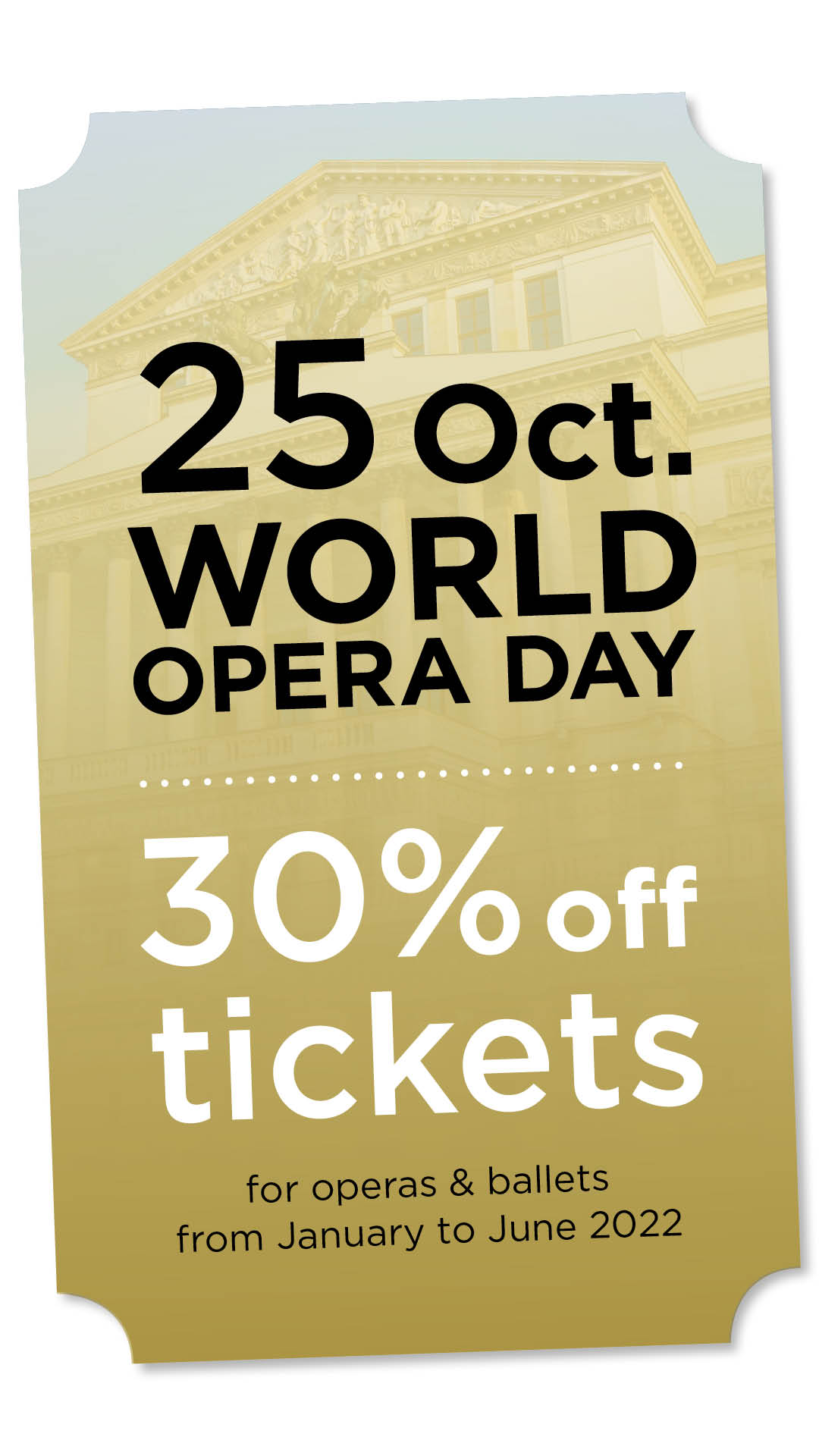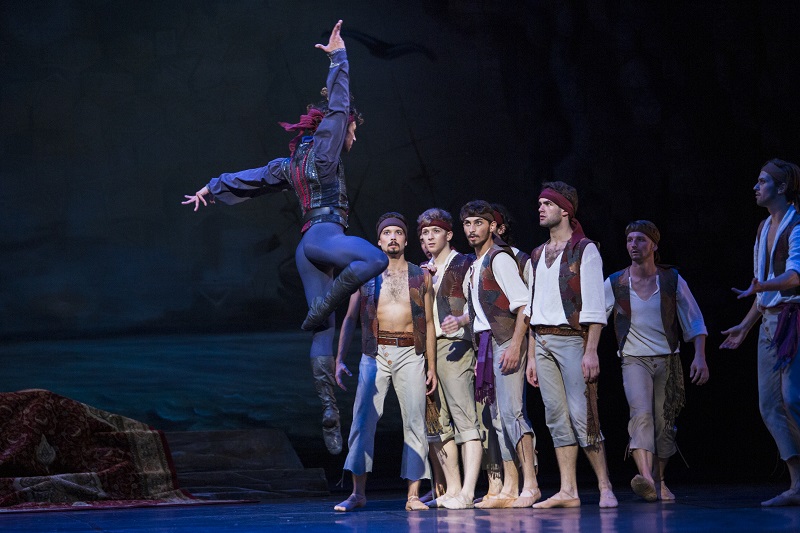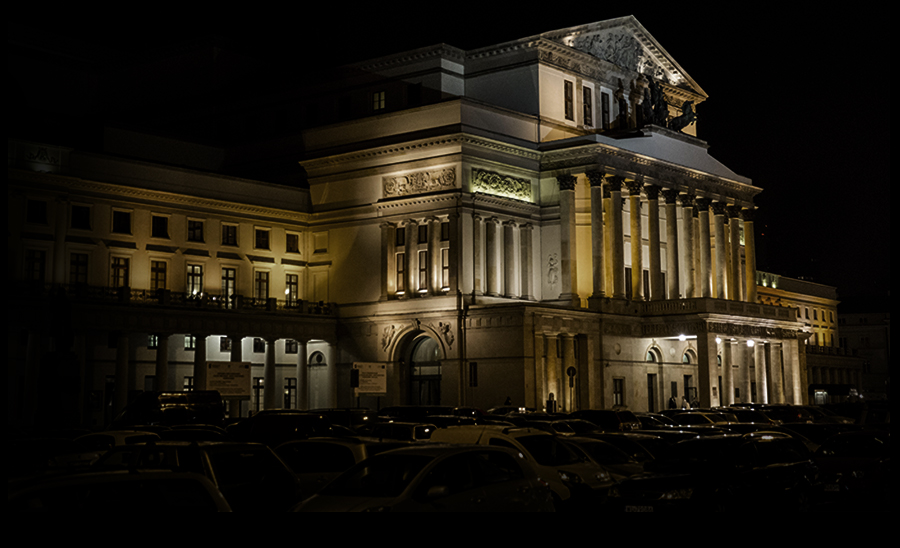 Dear Audience Members,
Dear Audience Members,
We are thrilled to unveil the programme of the second part of our artistic season. We have three premieres coming up along with a dozen revival performances. Tickets for all opera and ballet productions scheduled from 1 January to 30 June 2022 go on sale on 25 October, World Opera Day. Both ballet and opera tickets will be 30% off on their release date.
Please note: Discounted tickets must be bought on the spot. You cannot book them and pay later.
2022 PREMIERES
In March we will treat you to the world premiere of Henryk Jarecki’s opera Barbara Radziwiłł in concert version to be performed by Chorus and Orchestra of the Polish National Opera under Marta Kluczyńska. The historical figure of Barbara Radziwiłł, a controversial queen of Poland, has been inspiring painters, writers, directors, and composers for years. The most famous love story in Polish history marred by a conflict between personal happiness and state interests, and Barbara’s mysterious death blamed by some on dowager Queen Bona Sforza, who was suspected of having her daughter-in-law poisoned, also made an impression on composer Henryk Jarecki. The libretto is based on Dominik Magnuszewski’s three-act play with an epilogue titled Barbara jeszcze Gasztołdowa żona (Barbara Still The Wife of Goštautas). Considered examples of ‘grand operas of the post-Moniuszko era’, Jarecki’s works explore historical subject-matter and draw inspiration from Polish romantic and positivist literature. The production opens on 13 Match 2022.
April will see two new productions opening at the Polish National Opera: Mariusz Treliński’s new take on Boris Godunov and Krzysztof Pastor’s balletic interpretation of Dracula with music by Wojciech Kilar.
Mussorgsky’s opera is a brilliant music adaptation of Alexander Pushkin’s Shakespearian tragedy under the same title describing one of the most tragic periods in Russian history, called Smuta. This psychological drama exposes the mechanism of seizing and consolidating power assumed by violence and stealth. Developed in 2008, the director’s first take on Boris Godunov was originally staged at the Lithuanian National Opera and Ballet Theatre in Vilnius. It opened in Warsaw a year later. The press described the production as 'a raw, yet suggestive tale of a ruler killed by remorse' (Ruch Muzyczny) and 'a story about a tsar’s rise to power and his demise' (Gazeta Wyborcza). The new production is designed by Boris Kudlička. The production opens on 8 April 2022.
The last new production to open in the upcoming season is Krzysztof Pastor’s ballet Dracula with music by Wojciech Kilar. The show became a ballet sensation of 2018. Commissioned by the West Australian Ballet, it was given its debut in September 2018 in Perth. This ballet adaptation of Bram Stoker’s world-famous 1897 horror novel and its 1992 Oscar-winning film version by Francis Ford Coppola is danced to a carefully arranged score put together by Michael Brett that features different works by the Polish composer. Pastor’s Dracula is a moving period show about love that survives death. The work was nominated for the prestigious Helpmann Award for Best Ballet and received three Performing Arts WA Awards, for Best New Work, Best Costume Design, and Best Musical Arrangement. Patrick Fournillier conducts. The production opens on 28 April 2022.
Between January and June 2022 our audiences will be able to choose from a dozen of REVIVAL PERFORMANCES.

One of them is the visually astonishing production of The Magic Flute directed by Suzanne Andrade and Barrie Kosky. Brought to life in cooperation with the ‘1927’ duo, Kosky’s vision produced a dazzlingly hallucinatory show featuring actors playing in a live animation. References to silent film got beyond excessive gesturing and very dynamic facial expressions of the singers. The director calls it ‘a silent movie by Wolfgang Amadeus Mozart’ inspired by 18th-century chalcography, Yellow Submarine, Monty Python’s Flying Circus, and superhero comics. Produced by the Komische Oper Berlin, the production triumphed at opera houses across Europe.
Those who prefer more conventional stagings should consider the beautifully designed, sung, and played production of Tosca directed by Barbara Wysocka. Once the curtain goes up, we become witnesses to a tragic love story involving blackmail, cruelty, many dimensions of humanity and its lack, crime, and amoral attitudes that combine to create a deadly tornado. The events unfold in 1970s Italy amid the violence inflicted by the Red Brigades in response to the neo-fascist activities of the 1960s. The political turmoil, abuses of power, impotence of the state, social rebellion, violence and terror seems to affect the lovers’ tragic fate. The atmosphere is underscored by Puccini’s extraordinary music, including two arresting arias sung by the leads: Floria Tosca’s ‘Vissi d’arte’ and Mario Cavaradossi’s ‘E lucevan le stelle’.

The return of Kenneth MacMillan’s Mayerling, which premiered on our stage last season, will undoubtedly please dance lovers. This 20th-century classic set to music by Franz Liszt explores the true story of Prince Rudolf, the only son of Emperor Franz Josef I and Empress Sissy. The prince and teenage Baroness Mary Vetsera were discovered dead in Rudolf’s hunting cabin, supposedly, after committing a double suicide. There were some, however, who speculated that the heir to the Austro-Hunagrian throne had been murdered. The story inspired a host of films, including Terence Young’s Mayerling starring Omar Sharif and Catherine Deneuve, as well as catching the fancy of journalists and writers. The production is the work of one of the greatest choreographers of the 20th century and a real treat to the fans of the Polish National Ballet. Krzysztof Pastor’s ballet adaptation of Shakespeare’s The Tempest (music: H. Purcell, T. Tallis, R. Johnson, M. Locke, M. van der Aa, and traditional Iranian music) successfully draws on different orders, epochs and registers of culture. In the musical sphere, the Iranian daf frame drum takes the pride of place, while the poignant visualisations are the work of a duo of Iranian artists. The show is simply excellent: coherent, beautiful, and escaping simplistic interpretations.
Georges Bizet was commissioned to write Carmen by the director of the Opéra-Comique in Paris, Camille du Locle. The score came to life at the turn of 1874 and 1875. The libretto was devised by Henri Meilhac and Ludovic Halévy based on Prosper Mérimée’s novella. Ever since the premiere, Carmen has been fascinating dramaturges, writers, and filmmakers. She is and undisputed icon of femininity. Sensual, tempting, passionate, and mysterious, she is brave, unpredictable, temperamental, untamed, and proud. She is also a tragic heroine. This production is Andrzej Chyra’s directing debut at the Polish National Opera.
Audience members who will not manage to get hold of tickets to the premiere of Exodus / Flights- Harnasiechoreographed by the Hop/Weiss duo will get another chance to see the double bill in February and March 2022.
Anna Hop’s Exodus with music by Wojciech Kilar is a realisation of a monumental dance show exploring fate that decides the course of human life. The performance’s protagonist is a community trapped in a vicious circle of the same mistakes committed for millenniums. Inspired by flights of insects and birds, the choreography is an excellent representation of a collective body made up of individuals. In its visual aspect, the piece draws on the ‘crush art’ works of Bogusław Lustyk and Krzysztof Kieślowski’s The Decalogue.
The dramaturgy of Izadora Weiss’s Flights-Harnasie is based on an audacious combination of Olga Tokarczuk’s prose and Karol Szymanowski’s music. Weiss, who also designed costumes for the piece, brings together the Flights vignette from Tokarczuk’s Man Booker Prize winning novel under the same title, Szymanowski’s Symphony No. 4 (Symphonie concertante) and his Harnasie. Tokarczuk’s ‘flights’ can be called contemporary ‘harnasie’ – liberated people. The piece is based on constant movement and pursuit of freedom.
The two parts of the programme are brought together by Polish music and the motif of movement, travel, and searching for your place.
Beloved by our audiences, Gilberto Deflo’s classic take on Rigoletto begins with a riot of colours, textures, shapes, flashes, gilding and jewels for which credit is due to stage designer Ezio Frigerio and costume designer Franca Squarciapino. The director devised a traditional yet magical production that amazes with its meticulous attention to detail. The opera originally opened at the Gran Teatro La Fenice in 1851 as The Curse. It is a colourful, yet dramatic love story involving a court jester, his daughter Gilda, and the duke of Mantua. The libretto is based on Victor Hugo’s play Le roi s’amuse.

Le Corsair choreographed by Manuel Legris after Petipa is another must-see ballet production of the season. The libretto written by Manuel Legris and Jean-François Vazelle draws on George Byron, Jules-Henri Vernoy de Saint-Georges, and Joseph Mazilier. Tumultuous and full of unheard-of adventures, the love story of Conrad and Medora told in The Corsair (1814) ignited the imagination of subsequent generations of readers as well as serving as a basis for numerous ballet adaptations, the most frequently staged and reworked of them being the French version choreographed by Joseph Mazilier and set to music by Adolphe-Charles Adam, the composer of the famed Romantic ballet Giselle.
David Pountney’s staging of Moniuszko’s The Haunted Manor is an excellent opportunity to see a lighthearted show. The love intrigue is set at a period of cultural revival middle and upper classes. It moves and amuses, although it is hard to shake the feeling that the general gaiety and carefreeness may end at any minute. Watching the show, one might conclude that history does repeat itself and we should not take anything we have now for grated. Pountney transports his audience to the 1920s and 1930s, an era of escapism, hedonism, and frolics accompanied by the charming score of the Polish composer.
After an almost five-year hiatus, we will revive Mariusz Treliński’s iconic production of La traviata. The director sets the piece in the world of contemporary narcissist culture, celebrity razzmatazz, clubbing, cabaret, polyamory, and hedonism. The production features Karl Lagerfeld’s lookalike as well as stars of popular dance TV shows. The spectacular costumes are the work of well-known Warsaw-based fashion designers: Tomasz Ossoliński and Gosia Baczyńska. Patrick Fournillier conducts the Orchestra of the Polish National Opera.The production of Onegin by Mariusz Treliński is also set to make a comeback in the latter part of the season. Eugene is a socialite and womaniser who is too slow to realise that as a result of his own actions and decisions he lost the joy of his life and the sense of his existence. And – most importantly – Tatiana’s love. Even if he started out with a head full of dreams, he ends in a void. This searing emptiness, underscored by Boris Kudlička’s memorable set design, will accompany you after you have left the opera house like a silent spectre. It is impossible to forget.
Krzysztof Pastor’s ballet adaptation of Shakespeare’s The Tempest (music: H. Purcell, T. Tallis, R. Johnson, M. Locke, M. van der Aa, and traditional Iranian music) successfully draws on different orders, epochs and registers of culture. In the musical sphere, the Iranian daf frame drum takes the pride of place, while the poignant visualisations are the work of a duo of Iranian artists. The show is simply excellent: coherent, beautiful, and escaping simplistic interpretations.

The production of Onegin by Mariusz Treliński is also set to make a comeback in the latter part of the season. Eugene is a socialite and womaniser who is too slow to realise that as a result of his own actions and decisions he lost the joy of his life and the sense of his existence. And – most importantly – Tatiana’s love. Even if he started out with a head full of dreams, he ends in a void. This searing emptiness, underscored by Boris Kudlička’s memorable set design, will accompany you after you have left the opera house like a silent spectre. It is impossible to forget.
Typically played to a full house, Mariusz Treliński’s production of Moniuszko’s Halka is set in a socialist realist hotel in the Polish mountain resort town of Zakopane which, depending on the state of awareness of one of the protagonists, Janusz – is either a crime scene or a wedding venue. Tormented by his guilty conscience, Halka’s lover repeatedly wakes up from his nightmare to realise the reality is even worse. Right there and then he can hear the hurt girl’s voice, clear and piercing, from behind the scenes. Treliński’s cinematic vision is excellently complemented by Boris Kudlička’s set deign. Still, the duo’s magnificent staging does not overshadow the tragedy of the eponymous heroine.
We cannot wait to welcome you to the Polish National Opera soon. We hope that our offerings meet your expectations!
***
INFORMATION FOR VISITORS
The box office in the main lobby:
Tuesday–Sunday (and on Monday, 25 Oct.), 11 a.m.–7 p.m.
The Boutique and box office in the opera house’s left wing:
Daily, 11 a.m.–7 p.m.
Opera Gallery and Theatre Museum:
Tuesday–Sunday, noon–6 p.m.
We recommend that you buy your ticket online on www.teatrwielki.pl.
Every audience member who enters the opera house must submit their health declaration. Holders of opera, ballet and concert tickets may submit their health declarations online not earlier than 48 hours before the curtain-up. You may also complete the health declaration form in hardcopy and return it to one of the drop boxes set up by the ticket check. Audience members attending educational events, workshops, or exhibitions must complete their health declarations in hardcopy and return them to one of the drop boxes set up by the ticket check.






 ''
''